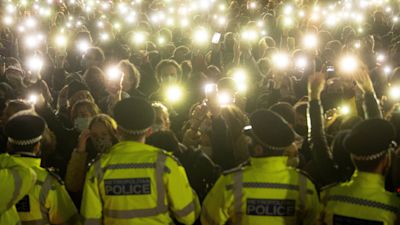Metropolitan Police criticised for 'indefensible' safety advice issued after Couzens sentencing

Words by ITV News Multimedia Producer Elisa Menendez
The Metropolitan Police’s advice to challenge lone plain-clothed officers in the wake of Sarah Everard’s murder shows “just how embedded misogyny” is in the force, a women’s charity has said.
Numerous organisations have hit out at Scotland Yard’s response to officer Wayne Couzens’ sentencing, saying it is “indefensible” and described it as yet another example of authorities placing the onus on women to change their behaviour to stay safe.
The force issued the advice to anyone who may be concerned that a police officer is not acting legitimately, after Couzens kidnapped 33-year-old Ms Everard by falsely arresting her with his warrant card.
What does the Met say people should do if they feel unsafe around police?
Referring to Couzens, Met Police Commissioner Dame Cressida Dick previously said there is the “occasional bad’un” in her force, while Policing Minister Kit Malthouse said on Friday he hoped the murderer was just “one bad apple”.
Estelle du Boulay, director at Rights of Women, told ITV News: “This was not, and never will be, about ‘bad apples’ – it’s about a system that is rotten to the core.
“The murder of Sarah Everard is one of the most recent examples of the police’s role in enabling violence against women and girls – and it is indefensible that their response is to put the onus on women to ensure our own safety, and that they view this as an acceptable solution to male violence by police.”
She said the response “reveals just how embedded the culture of misogyny, abuse of power and impunity is in the police” as she called on the government to take a “transparent” approach to holding “this failed system to account”.
What do activists and campaigners make of the advice given by the Met?
What was the Met Police's advice?
Following Couzens' whole life sentence, the Met said it will no longer deploy plain clothes officers on their own and recommended if approached by an officer not acting legitimately during an interaction to challenge them.
The force recommends asking where the officer’s colleagues are, where they have come from, why they are there, and exactly why they are stopping or talking to them.
It also suggested verifying the officer by asking to hear their radio operator or asking to speak to the radio operator themselves.
As a last resort, people are advised to shout at a passer-by, run into a house, wave down a bus or dial 999.
What has the reaction to that advice been?
CEO of Refuge Ruth Davison said the Met’s response is “simply not good enough” and that “women deserve better”.
“At Refuge, we have long known that the women we support have little trust in the police to protect them,” she added. “That’s why so few women feel able to report incidents of domestic abuse.”
She said Couzens’ “heinous behaviour” has “eroded what little trust women have in the police even further” and the force must “root out the misogyny that is at the heart of these failings”.
CEO of charity Rape Crisis Jayne Butler said “it is not women who should have to change” and that the guidance is “doing nothing to address the systemic issues in the police that have led to this situation”.
Their criticisms came after Philip Allott, a police, fire and crime commissioner (PFCC), apologised after suggesting women needed to be “streetwise” following the kidnap of Ms Everard, who was falsely told she had breached Covid-19 regulations by Couzens.
Mr Allott told BBC Radio York on Friday: “So women, first of all, need to be streetwise about when they can be arrested and when they can’t be arrested. She should never have been arrested and submitted to that.
“Perhaps women need to consider in terms of the legal process, to just learn a bit about that legal process.”
In a tweet later, the PFCC for North Yorkshire said: “I would like to wholeheartedly apologise for my comments on BBC Radio York earlier today, which I realise have been insensitive and wish to retract them in full.”
What other investigations linked to Couzens are now underway?
It has now been revealed that Couzens was linked to an indecent exposure allegation in Kent in 2015 but remained in his post.
Five serving police officers are being investigated for gross misconduct over a WhatsApp group they allegedly shared with the murderer.
Messages in the WhatsApp group, which also contained a former officer, were said to be "discriminatory and/or inappropriate nature", and reports say they featured misogynistic content.
Two of the officers, who worked for the Metropolitan Police - along with a former officer who previously worked for the force - are also facing criminal investigations over an alleged breach of Section 127 of the Communications Act.